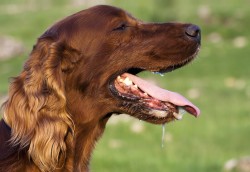The weather during August in Wisconsin can sometimes be the hottest month of the year. Not only do we feel the heat and humidity, but our four-legged friends also share the experience. As we move into the dog days of summer, here are some helpful tips to avoid heat-induced emergencies and aid in making your pet more comfortable.
Travel
While we might enjoy taking our pet with us on daily errands, the temperature inside of a car can reach lethal proportions in a matter of just a few minutes with the windows rolled up. It is important to remember not to leave your pet in a vehicle during a hot day. Heatstroke, or hyperthermia, can occur within moments. We suggest leaving your pet at home on these warmer days rather than run the risk of your trip turning into a critical emergency.
Outdoor Pets
Many of our outdoor pets and farm animals are fairly well adjusted to the heat we experience during the summer months. However, it is imperative to provide these animals with some shade or shelter to escape the intense sunlight. Along with an appropriate amount of shade, keeping your pet’s water bowl full and accessible is essential to avoiding heatstroke. Adding ice to water can also add relief from the heat.
Exercise
We want to keep our pets healthy and fit over the span of their lifetime, but we don’t want to overdo it on a nice summer’s day. Make sure to bring plenty of water for your pet to drink and keep a close watch on their behaviors throughout the day, specifically watching for any sign of distress. Water sports are a fantastic way to keep your dog trim and stimulated while offering a nice way to cool off. Dogs do not have sweat glands as we do; they rely on panting as a way to relieve body heat.
Cats
Our feline friends may not journey around with us as often as their canine counterparts, but they can still suffer from heat-related emergencies. We have a large feral cat population in southeastern Wisconsin, along with barn cats and domesticated felines. Any animal left in a situation where there is no escape from the heat and no water or shelter provided can become a victim of heatstroke. We do not recommend attempting to handle a feral or wild cat, but if you notice one in distress you can contact your local humane society for assistance. Open mouth breathing or panting in cats is an emergency situation.
So what are the signs of hyperthermia (heat stroke)?
- Body temperature of over 104 degrees.
- Bright red or dark red gums and tongue.
- Staggering, stupor, unable to walk normally.
- Excessive panting.
- Seizures.
- Bloody diarrhea.
- Vomiting.
- Death.
If you notice any sign of heatstroke, please take your pet directly to a local emergency center.

